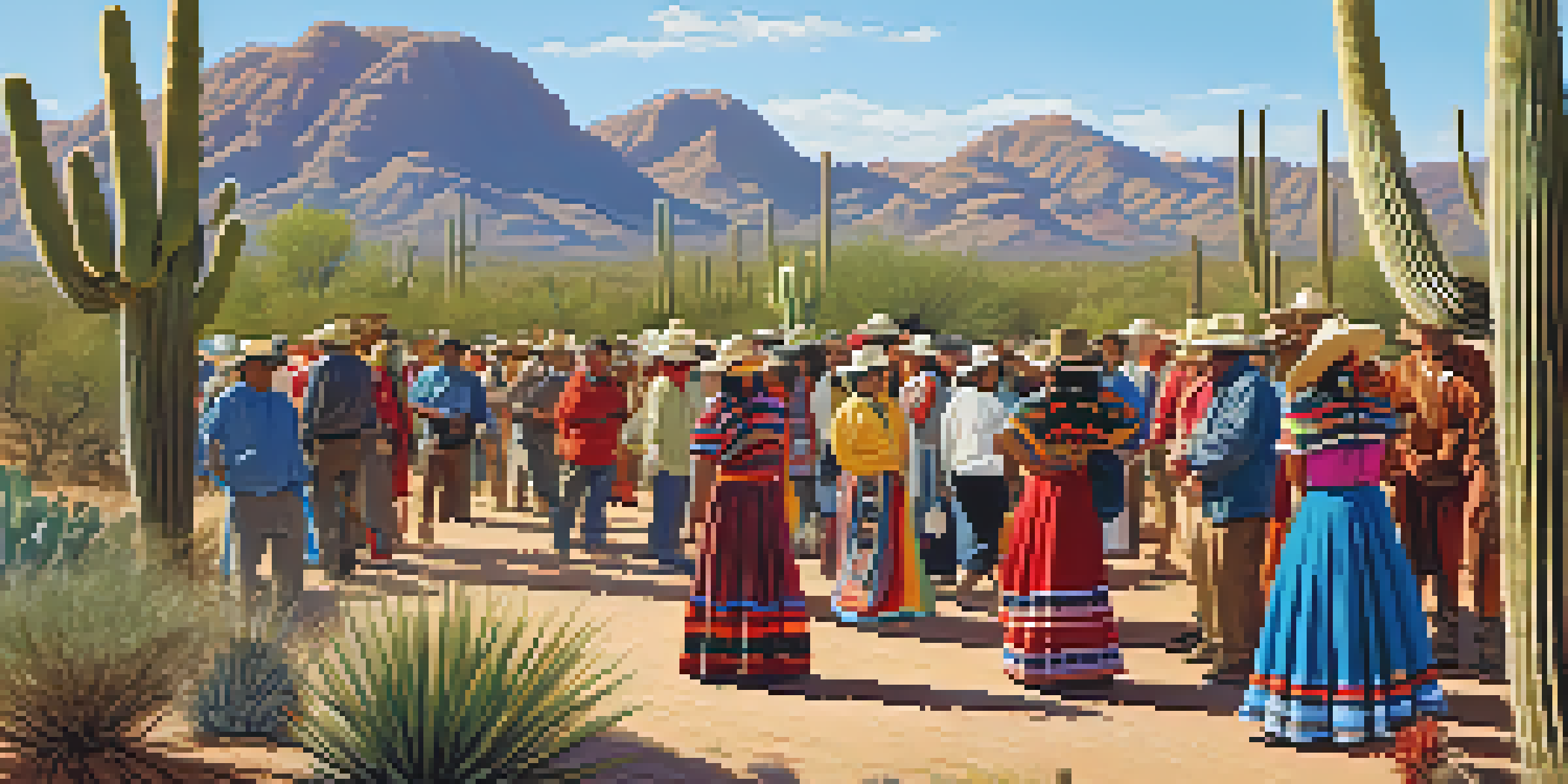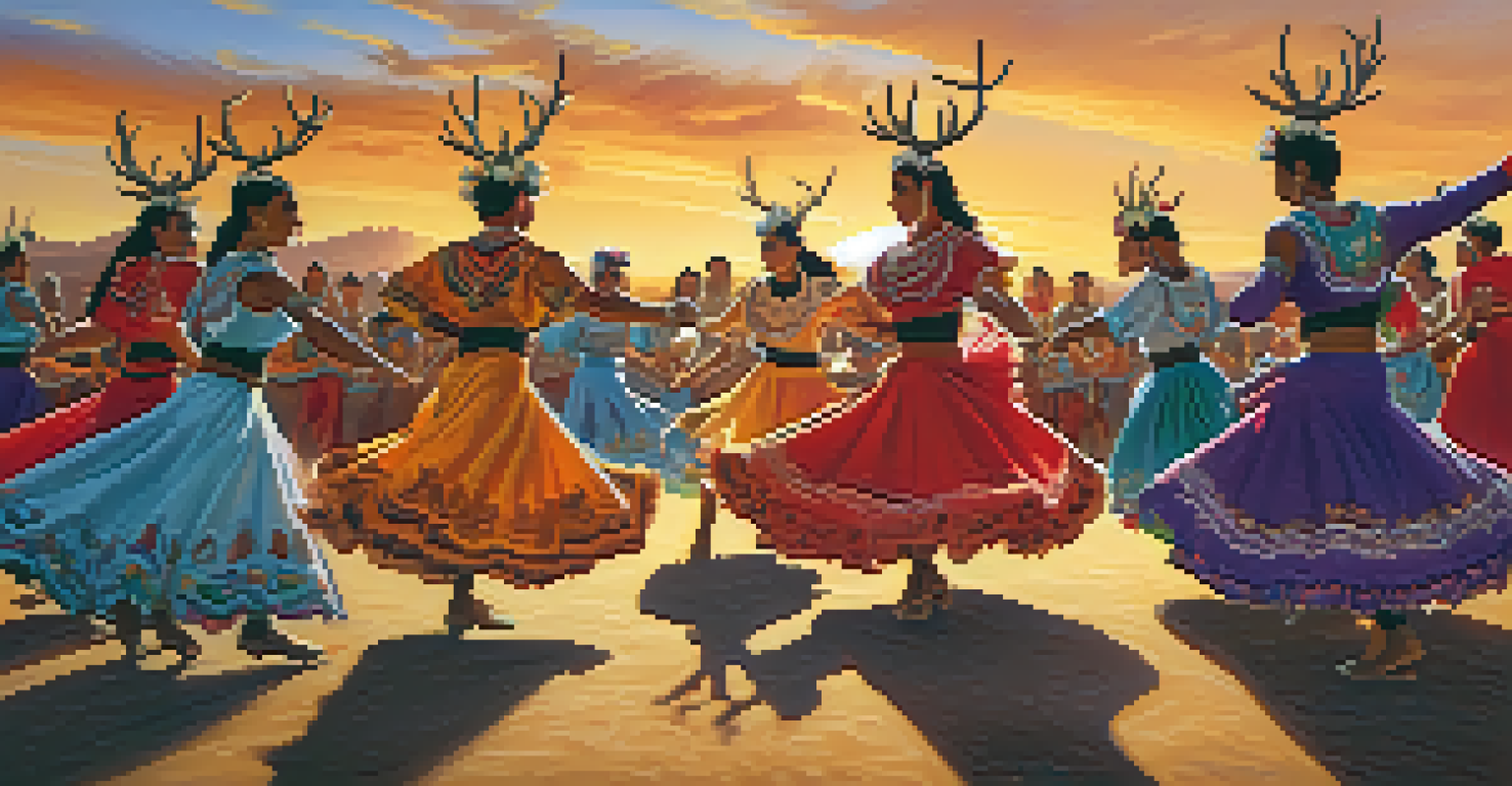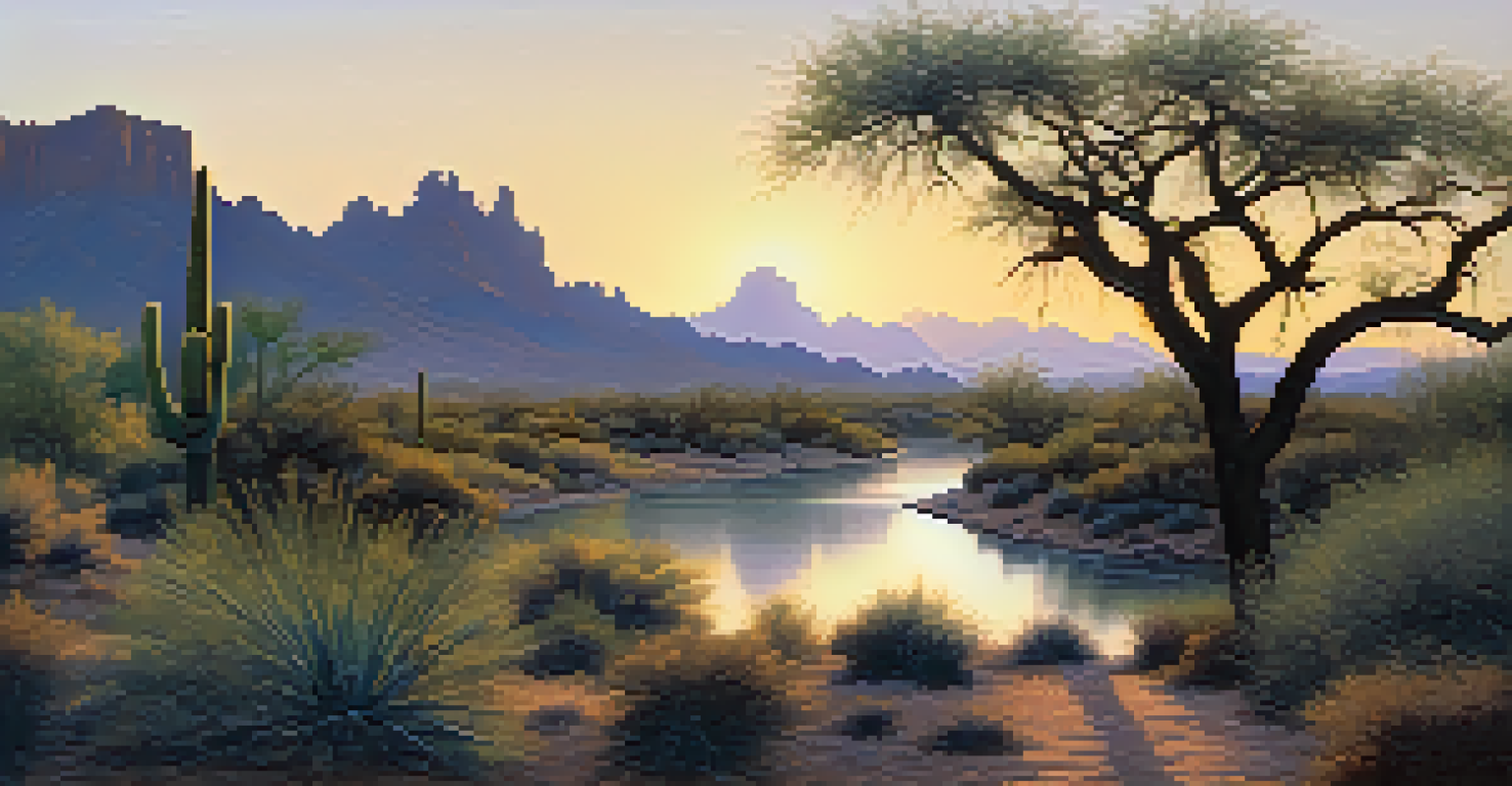Understanding Tucson's Historical Ties with Indigenous Tribes

Tucson's Geographical Significance to Indigenous Peoples
Tucson's location in the Sonoran Desert has made it a vital area for Indigenous tribes for centuries. The confluence of rivers and diverse ecosystems provided essential resources for survival, such as water, food, and shelter. This geographical advantage allowed tribes like the Tohono O'odham and Pascua Yaqui to thrive and develop rich cultures over generations.
The land is sacred and it has a story that is told through the people who live on it.
The region's unique climate and terrain also fostered agricultural practices. Indigenous peoples cultivated crops like maize, beans, and squash, which were staples in their diets. The cultivation of these crops not only sustained their communities but also created a profound connection to the land, shaping their customs and traditions.
Additionally, Tucson served as a central hub for trade among Indigenous tribes. The flow of goods, ideas, and cultural practices through this area enriched the lives of its inhabitants and laid the groundwork for a diverse cultural tapestry that still influences Tucson today.
The Influence of the Tohono O'odham Nation
The Tohono O'odham Nation, one of the largest Indigenous tribes in the region, has a profound historical presence in Tucson. Their cultural practices, language, and traditions are rooted in a deep respect for the land and its natural resources. This connection is evident in their agricultural practices and the importance of traditional crops.

Tohono O'odham art and music also reflect their rich heritage, showcasing intricate basket weaving and vibrant storytelling through song. These artistic expressions not only preserve their history but also educate others about their culture. This vibrant cultural legacy is celebrated in various local events and festivals in Tucson.
Indigenous Tribes Thrive in Tucson
The geographical advantages of Tucson's location have supported Indigenous tribes like the Tohono O'odham and Pascua Yaqui, allowing them to cultivate rich cultures and traditions.
Moreover, the Tohono O'odham have played a crucial role in advocating for Indigenous rights and environmental stewardship. Their ongoing efforts to protect their lands and resources resonate throughout Tucson, reminding the community of the importance of preserving Indigenous heritage.
Pascua Yaqui Tribe's Contributions to Tucson
The Pascua Yaqui Tribe, another significant Indigenous group in Tucson, has a rich cultural history that dates back centuries. They are known for their vibrant traditions, including the Yaqui deer dance, which is a crucial part of their cultural identity. This dance not only serves as a form of celebration but also as a way to honor their ancestors.
Language is the road map of a culture. It tells you where its people come from and where they are going.
Their influence extends beyond culture; the Pascua Yaqui Tribe has made substantial contributions to the local economy and community. By establishing businesses and community programs, they have created opportunities that benefit both tribal members and the broader Tucson community.
Furthermore, the Pascua Yaqui Tribe actively engages in educational initiatives, promoting awareness of their history and traditions. This commitment to education fosters a deeper understanding and appreciation for Indigenous cultures among Tucson residents, bridging gaps and building connections.
The Role of Indigenous Languages in Cultural Identity
Languages like O'odham and Yaqui are vital components of the cultural identity for Indigenous tribes in the Tucson area. These languages carry stories, traditions, and values that have been passed down through generations. Unfortunately, many Indigenous languages face the threat of extinction, making their preservation crucial.
Efforts to revitalize these languages are underway, with local schools and community programs integrating language instruction into their curriculums. These initiatives not only empower Indigenous youth but also foster pride in their heritage. Learning these languages deepens cultural connections and ensures that important narratives are not lost.
Cultural Heritage and Modern Advocacy
Indigenous communities in Tucson actively celebrate their heritage while addressing contemporary challenges such as land rights and environmental protection.
Moreover, the use of Indigenous languages in public spaces and cultural events helps raise awareness among non-Indigenous communities. By embracing these linguistic traditions, Tucson can create a more inclusive environment that honors its rich Indigenous heritage.
Indigenous Spiritual Beliefs and Practices
Spirituality plays a central role in the lives of Tucson's Indigenous peoples, deeply intertwined with their connection to the land and community. Many tribes hold a belief in the interconnectedness of all living things, which influences their customs and rituals. This perspective fosters a sense of responsibility towards nature and encourages sustainable living.
Ceremonies and rituals are an essential aspect of Indigenous spirituality, serving as a way to honor the Earth and its cycles. These practices often involve community participation, reinforcing social bonds and shared values. Events such as harvest celebrations or seasonal ceremonies bring people together to celebrate their heritage and emphasize gratitude for the land.
Additionally, storytelling remains a vital means of passing down spiritual teachings and cultural values. These narratives often reflect the tribe's relationship with nature and their ancestors, serving as not only entertainment but also as moral guidance for future generations.
Modern Challenges Facing Indigenous Communities
Despite their rich history, Indigenous communities in Tucson face numerous challenges today. Issues such as land rights, water access, and economic development are ongoing concerns that impact the well-being of these tribes. The historical injustices and marginalization have created a need for continued advocacy and support for Indigenous rights.
Environmental concerns are also paramount, as Indigenous lands are often threatened by development and resource extraction. The fight to protect sacred sites and natural resources remains a significant aspect of Indigenous activism in Tucson. Community members are working tirelessly to raise awareness about these issues and to preserve their cultural heritage.
Language Preservation Efforts
Revitalization initiatives for Indigenous languages like O'odham and Yaqui are crucial for maintaining cultural identity and fostering pride among younger generations.
Furthermore, healthcare and education disparities continue to affect Indigenous populations. Addressing these inequalities requires collaboration between Indigenous leaders and local governments to ensure that the needs of these communities are met and that their voices are heard.
Celebrating Indigenous Heritage in Tucson Today
Tucson is home to various events and festivals that celebrate Indigenous culture and heritage. These gatherings provide an opportunity for the community to come together and appreciate the rich traditions of the Indigenous tribes in the area. Events like the Tucson Meet Yourself festival showcase Indigenous food, art, and performances, fostering cultural exchange and understanding.
Local museums and cultural centers also play a pivotal role in promoting Indigenous heritage. Exhibits that highlight the history and contributions of Indigenous peoples in Tucson provide a platform for education and awareness. By showcasing Indigenous art and artifacts, these institutions help to preserve and honor the legacy of the tribes.

Moreover, collaboration between Indigenous communities and local organizations fosters a sense of unity. Initiatives aimed at promoting cultural education in schools and community programs help ensure that Indigenous history is recognized and respected. Celebrating this heritage enriches Tucson's cultural landscape and strengthens community ties.